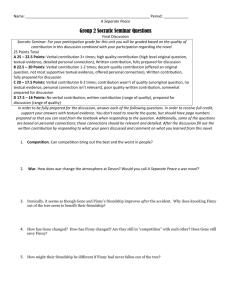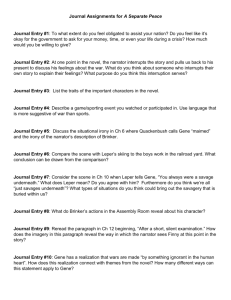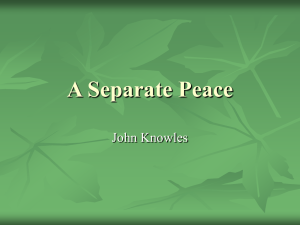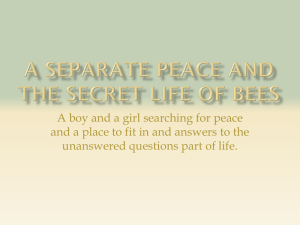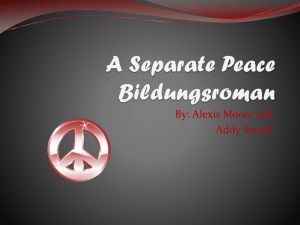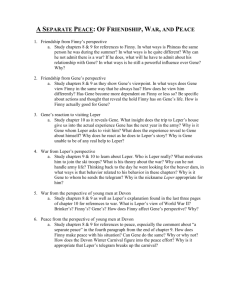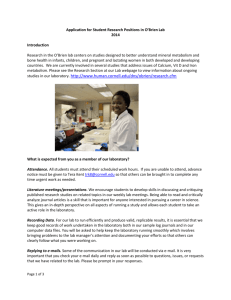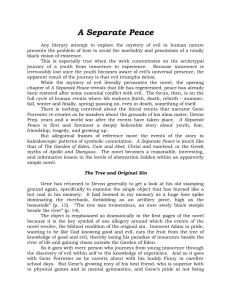These is my Words, by Nancy E. Turner Summer Reading Questions
advertisement
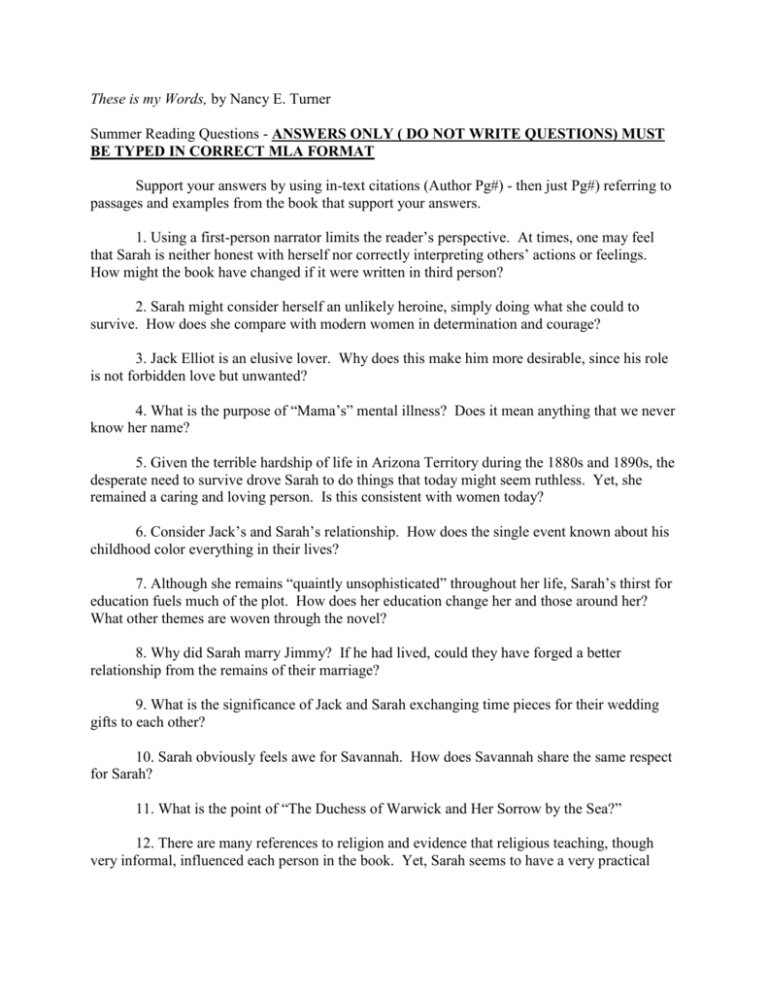
These is my Words, by Nancy E. Turner Summer Reading Questions - ANSWERS ONLY ( DO NOT WRITE QUESTIONS) MUST BE TYPED IN CORRECT MLA FORMAT Support your answers by using in-text citations (Author Pg#) - then just Pg#) referring to passages and examples from the book that support your answers. 1. Using a first-person narrator limits the reader’s perspective. At times, one may feel that Sarah is neither honest with herself nor correctly interpreting others’ actions or feelings. How might the book have changed if it were written in third person? 2. Sarah might consider herself an unlikely heroine, simply doing what she could to survive. How does she compare with modern women in determination and courage? 3. Jack Elliot is an elusive lover. Why does this make him more desirable, since his role is not forbidden love but unwanted? 4. What is the purpose of “Mama’s” mental illness? Does it mean anything that we never know her name? 5. Given the terrible hardship of life in Arizona Territory during the 1880s and 1890s, the desperate need to survive drove Sarah to do things that today might seem ruthless. Yet, she remained a caring and loving person. Is this consistent with women today? 6. Consider Jack’s and Sarah’s relationship. How does the single event known about his childhood color everything in their lives? 7. Although she remains “quaintly unsophisticated” throughout her life, Sarah’s thirst for education fuels much of the plot. How does her education change her and those around her? What other themes are woven through the novel? 8. Why did Sarah marry Jimmy? If he had lived, could they have forged a better relationship from the remains of their marriage? 9. What is the significance of Jack and Sarah exchanging time pieces for their wedding gifts to each other? 10. Sarah obviously feels awe for Savannah. How does Savannah share the same respect for Sarah? 11. What is the point of “The Duchess of Warwick and Her Sorrow by the Sea?” 12. There are many references to religion and evidence that religious teaching, though very informal, influenced each person in the book. Yet, Sarah seems to have a very practical approach to theology while Savannah remains deeply spiritual. How does this balance maintain each of them? A Separate Peace, John Knowles Summer Reading Questions - - ANSWERS ONLY ( DO NOT WRITE QUESTIONS) MUST BE TYPED IN CORRECT MLA FORMAT Support your answers by using in-text citations (Author Pg#) - then just Pg#) referring to passages and examples from the book that support your answers. Chapters 1-4 1. Why do you think the author tells the story as a flashback from Gene’s point of view? 2. Explain why Gene returns to Devon. 3. How well do you think Gene handled Finny’s insistence that he jump from the tree? What might you have done? 4. How do Gene’s conflicts at Devon reflect the world war? 5. What does the game of blitz ball show about Finny? 6. Describe the relationship between Gene and Finny. 7. Why do you think Gene jiggles the branch? Explain his reaction to Finny’s fall. Chapters 5-8 8. Why does Finny refuse to accept the truth about his fall? 9. What does Gene mean when he says that his purpose was to “become a part of Phineas”? 10. Speculate about how Brinker’s prediction that the “truth will out” might be fulfilled. 11. Explain the meaning of Gene’s remark that “if [something deadly] wasn’t there, as for example with Phineas, I put it there myself.” 12. What is the significance of Devon’s placement between Devon and Naguamsett Rivers? 13. How does Finny deceive himself after his return to Devon? How do his self deceptions deceive Gene? Chapters 9-13 14. What does Gene mean when he calls the Winter Carnival Finny’s “choreography of peace”? 15. When Gene visits Leper, what does he learn about the war? About himself? 16. What makes Finny finally accept the reality of the war? 17. In your opinion, are Gene and Finny reconciled? Giver reasons for your answer. 18. What are the literal and symbolic causes of Finny’s death? 19. What is Gene’s final assessment of Finny? 20. How do you interpret the meaning of the title A Separate Peace. All Quiet on the Western Front, Erich Maria Remarque Summer Reading Questions - - ANSWERS ONLY ( DO NOT WRITE QUESTIONS) MUST BE TYPED IN CORRECT MLA FORMAT Support your answers by using in-text citations (Author Pg#) - then just Pg#) referring to passages and examples from the book that support your answers. 1. Corporal Himmelstoss had the reputation of being the strictest disciplinarian in the camp. What were two of the tasks he had Paul Baumer perform? 2. Characterize these three men: Katczinsky, Kropp, and Tjaden. 3. What did Baumer consider to be the finest thing to arise out of the war? 4. What does war do to men beside wounding and killing them? 5. Why are Kropp and Kat so callous about laying bets on an air fight above them? Even though it is the German who is finally shot down, Kropp only regrets it because he loses the bet. 6. Explain Paul’s uneasiness and dissatisfaction with himself, his relatives and his neighbors when he is home on leave. Consider the incident with the Major, too. 7. Interpret the following lines. “Give ‘em all the same grub and all the same pay And the war would be over and done in a day.” 8. Explain the tone in the paragraph beginning with “But the bayonet has practically lost its importance” on page 104. 9. Who is the “enemy” in this book? Explain your answer and do not be limited by just what you have read in this one book. 10. What are the main themes of All Quiet on the Western Front? 11. How does Remarque portray the technological and military innovations of the How do these innovations affect the lives of the soldiers? war? 12. Think about the concept of enemies in war. Whom do Paul and his friends regard as their enemies? 13. Why do Paul and men of his age group fear the end of the war as much as they fear the war itself? 14. According to the text, how does war empower petty, power-hungry men? Think especially about Himmelstoss. How do the other characters cope with their forced subordination? 15. In what ways does the novel critique the romantic rhetoric of war, honor, and patriotism? How might this critique extend to nineteenth-century ideas of nationalism? Think especially about the soldier’s reaction to Kantorek’s letter. 16. What is Paul like as a character? Has the brutality of war completely stripped away his humanity, or does he retain vestiges of his old self? 17. Discuss how the goals of the novel, as stated by the epigraph or suggested by the text, affect the work’s form and style. Does Remarque compromise his realistic style in order to deliver a message? Is Kantored too one-dimensional a character? The Things They Carried by Tim O’Brien Summer Reading Questions - - ANSWERS ONLY ( DO NOT WRITE QUESTIONS) MUST BE TYPED IN CORRECT MLA FORMAT Support your answers by using in-text citations (Author Pg#) - then just Pg#) referring to passages and examples from the book that support your answers. 1. Why is the first story, The Things They Carried, written in third person? How does this serve to introduce the rest of the novel? What effect did it have on your experience of the novel when O’Brien switched to first person, and you realized the narrator was one of the soldiers? 2. In the list of all the things the soldiers carried, what item was most surprising? Which item did you find most evocative of the war? Which items stay with you? 3. In “On The Rainy River,” we learn the 21-year-old O’Brien’s theory of courage: “Courage, I seemed to think, comes to us in finite quantities, like an inheritance, and by being frugal and stashing it away and letting it earn interest, we steadily increase our moral capital in preparation for that day when the account must be drawn down. It was a comforting theory.” What might the 43-year-old O’Brien’s theory of courage be? Were you surprised when he described his entry into the Vietnam War as an act of cowardice? Do you agree that a person could enter a war as an act of cowardice? 4. What is the role of shame in the lives of these soldiers? Does it drive them to acts of heroism, or stupidity? Or both? What is the relationship between shame and courage, according to O’Brien? 5. Often, in the course of his stories, O’Brien tells us beforehand whether or not the story will have a happy or tragic ending. Why might he do so? How does it affect your attitude towards the narrator? 6. According to O’Brien, how do you tell a true war story? What does he mean when he says that true war stories are never about war? What does he mean when he writes of one story, “That’s a true story that never happened”? 7. In “Sweetheart of the Song Tra Bong,” what transforms Mary Anne into a predatory killer? Does it matter that Mary Anne is a woman? How so? What does the story tell us about the nature of the Vietnam War? 8. The story Rat tells in “Sweetheart of the Song Tra Bong” is highly fantastical. Does its lack of believability make it any less compelling? Do you believe it? Does it fit O’Brien’s criteria for a true war story? 9. Aside from “The Things They Carried,” “Speaking of Courage” is the only other story written in third person. Why are these stories set apart in this manner? What does the author achieve by doing so? 10. What is the effect of “Notes,” in which of O’Brien explains the story behind “Speaking of Courage”? Does your appreciation of the story change when you learn which parts are “true” and which are the author’s invention? 11. In “In the Field,” O’Brien writes, “When a man died, there had to be blame.” What does this mandate do to the men of O’Brien’s company? Are they justified in thinking themselves at fault? How do they cope with their own feelings of culpability? 12. In “Good Form,” O’Brien casts doubt on the veracity of the entire novel. Why does he do so? Does it make you more or less interested in the novel? Does it increase or decrease your understanding? What is the difference between “happening-truth” and “story-truth?” 13. On the copyright page of the novel appears the following: “This is a work of fiction. Except for a few details regarding the author’s own life, all the incidents, names, and characters are imaginary,” How does this statement affect your reading of the novel? 14. Does your opinion of O’Brien change throughout the course of the novel? How so? How do you feel about his actions in “The Ghost Soldiers?” 15. “The Ghost Soldiers” is one of the only stories of The Things They Carried in which we don’t know the ending in advance. Why might O’Brien want this story to be particularly suspenseful?
